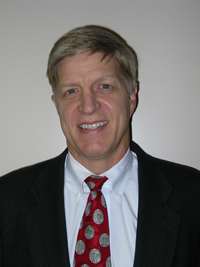 |
James O’Dell, M.D. |
NOTE: This profile is part of a series highlighting the 26 researchers who were named UNMC Distinguished Scientists or New Investigators for 2007. Each of these researchers will be profiled in UNMC Today leading up to a March 20 ceremony to recognize their achievements.
- Name: James O’Dell, M.D.
- Title: Larson Professor and vice chairman of internal medicine; chief of rheumatology
- Joined UNMC: 1984
- Hometown: Omaha
Briefly describe your research in laymen terms, please.
My research focuses on finding new and better ways to treat rheumatoid arthritis (RA). With the clinical network that we have developed, the Rheumatoid Arthritis Investigational Network (RAIN), we specialize in investigator-initiated clinical trials.
What led you to pursue this area of research?
Rheumatoid arthritis is a severe, crippling form of arthritis that commonly affects people, especially women, in the prime of life. In the late 1980s, when our work started, there was a paucity of therapeutic options. Fortunately, clinicians now have many effective options available and the outlook for RA patients has improved dramatically.
How do you see your research contributing to science?
The Rheumatoid Arthritis Investigational Network is the largest and best known RA clinical trial network in the United States for investigator-initiated trials. With our NEJM study in 1996, we pioneered the use of combinations of DMARDs to treat RA patients; this model is now used worldwide for the majority of RA patients. The Rheumatoid Arthritis Investigational Network published the first report of the use of genetics to differentially predict response to therapy. We also have published extensively on minocycline, a cheap and effective alternative to other very expensive therapies in RA
Why did you become a scientist?
That is a tough question. I have always enjoyed science, math, and problem-solving. My undergraduate degree is in engineering but I realized I really wanted to work more closely with people. I went into academic medicine initially because I love to teach. Internal medicine, rheumatology and clinical research have allowed me to combine all of these interests — I have the best job in the world.
What is your hope for the next generation of scientists?
The future is bright with new discoveries coming at an ever-increasing pace. I hope that our current academic institution continues to thrill and allow independent innovative research. I’m concerned about the pervasive influence of big business both from outside the universities and also from the inside.
Beyond grant funding, how do you measure success?
I think there are many things that are much better markers of success than the dollar total of your grants. Maybe that is because my funding has at times been modest. The acceptance of your work by your peers and, if you are lucky, their accolades, is obviously an important yardstick. The degree that you have influenced careers and mentored the next generation of researchers is important. If you can look around and see others that are building careers that you have played a role in, that is very satisfying. Ultimately, especially as a clinical researcher, you measure success by whether your work has made the lives of your patients and patients around the world better.
What would you tell a student interested in a research career?
Be open to opportunities. Few, if any, successful researchers had a good idea when they started out of where they would end up. Be aggressive in taking the initiative. In research, you have to go after for it, it seldom comes to you –but at the same time — be patient in finding your niche/passion. Don’t get caught up in chasing grant dollars for the sake of grant dollars but instead, once you have identified your passion, remain focused on it. Many careers are ruined by lack of focus. Finally, but clearly most importantly, seek a mentor who is sincerely interested in your career, not just their own. They won’t always even be in your area of interest, but if they know the ropes and are interested in you, then you will benefit greatly.
Do you have a hero/role model? If so, what do you admire most about them?
On a personal level, my grandfather has always been my hero — I admired his honesty, profound integrity and amazing ability to make the lives of everyone who came in contact with him better. On a professional level, I have had many. Locally, Michael Sorrell (M.D.) has been an important mentor, convincing me to pursue a career in academic medicine, recruiting me back to Nebraska and always helping me advance my career. Like any great mentor, he has sincerely been interested in my career.
Tell us about your family and hobbies outside of the lab.
We raised our three children in the Field Club area, so I have always had about a three minute commute. My wife, Deb, is a nurse and works in home health care. My two daughters, Kim and Jennie, are in the women’s clothing business and my son, Scott, is in college. I’m a huge Husker fan, and enjoy golf and travel. I have been very active in the American College of Rheumatology for the last 20 years and its journal, “Arthritis and Rheumatism.”
List three things few people know about you.
- I’m a part owner (with my daughters) in two wonderful clothing boutiques in Omaha-beyourself and The Giving Tree.
- I swim a lot because, ironically, I have arthritis.
- I enjoy woodworking.